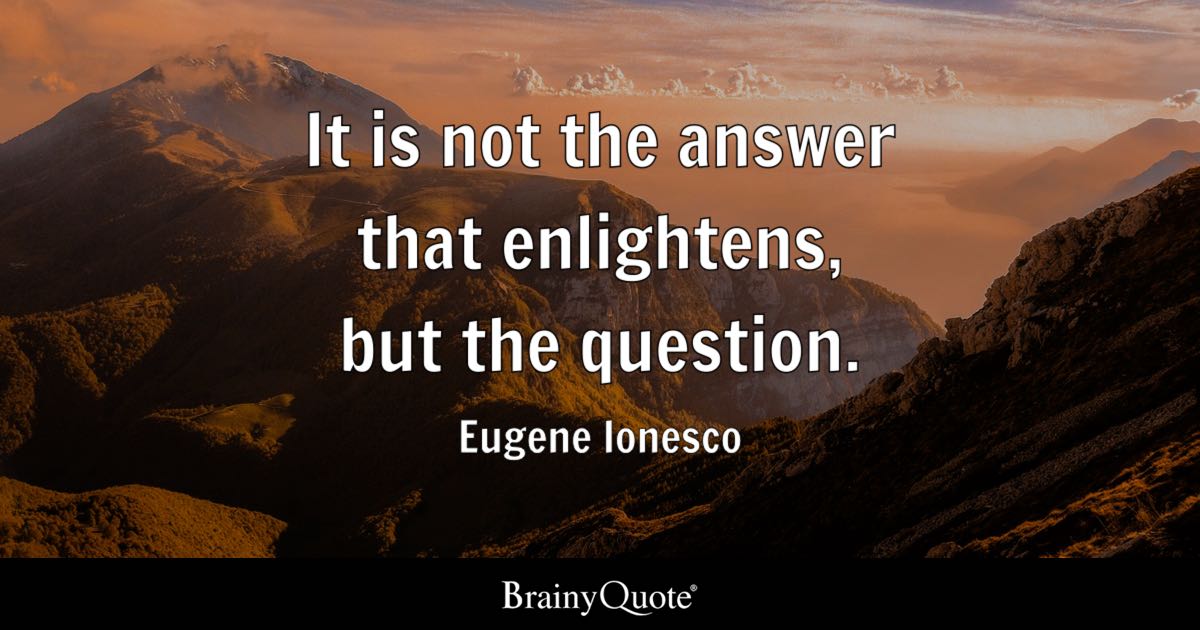It Is Not the Answer That Enlightens But The Question
“The best scientists and explorers have the attributes of kids! They ask questions and have a sense of wonder. They have curiosity. ‘Who, what, where, why, when and how!’ They never stop asking questions, and I never stop asking questions, just like a five- year-old.” – Sylvia Earle
Although questions can be powerful, your demeanor and reception to the answers are also crucial. Anyone can ask questions, but what you do when you receive the answers is extremely important.
Here is what I have noticed from the leaders that I have worked with in all roles of education, and things that I am personally trying to work on:
They show humility.
When asking a question, they are humble and curious about the answer they receive. They are not looking for “their answer,” otherwise the “question” was more as a test than it was to learn and grow in a genuine manner. It doesn’t mean that they have to agree with the answer, but they are open to learning and understanding the experience from a differing viewpoint. Every person we work with has different knowledge, strengths, and experiences and as Dale Carnegie states in “How To Win
Friends and Influence People”: “Every man is my superior in some way. In that, I learn from him.” Leading to the next idea.
They genuinely listen to the answer.
“Most people do not listen with the intent to understand; they listen with the intent to reply.” Stephen R. Covey
Sometimes, and I am guilty of this myself, we ask questions that we want to hear our answer. But taking time to listen really, soak in and understand information, is a skill that needs to be developed. If we aren’t willing to listen to the answer, the question shouldn’t have been asked in the first place.
They connect their learning to their context.
When we ask questions, blindly accepting what you find is not a good strategy. But in every context and community, the same “answer” can look different, and opportunities for learning are apparent if you are willing to look for them. Even in the “bad answers” we can learn. Connecting ideas, both in and out of education, can lead to more creative solutions.
In the article. “This One Habit Will Take Your Creative Thinking to the Next Level,” the author discusses the idea of “cognitive entrenchment,” which can hold “Someone who is solely focused on their industry has less chance of making a creative breakthrough than someone who can import perspectives and heuristics and ideas from other industries. In psychology, there’s a concept called ‘cognitive entrenchment’ that basically says it’s harder to be creative in a field the longer you’re in it if you don’t get outside much. This is why I’m convinced that Einstein’s playing a mean violin–not to mention looking at patents in umpteen different fields at his desk job–was helpful to him in his physics work.”
We can learn from anywhere if we are willing to be observant.
I have always focused on relationships as it is impossible to carbon copy solutions and for the outcomes to be the same. Individuals and communities are different, and if one thing worked for everyone, then we would all know that one thing. Applying what you have learned in your context is crucial in serving the people in front of you. I believe that the best research any educator can do is knowing the student in front of them.
Genuine curiosity is crucial in growth and development, individually and as schools and organizations. Asking better questions, being humble, genuinely listening with the intent to understand, and trying to connect what we learn in our context is crucial to when we find the answers and will ensure that we won’t have to speak for our work, but our work will speak for itself.
Source: George Couros blog
Author: George Couros
